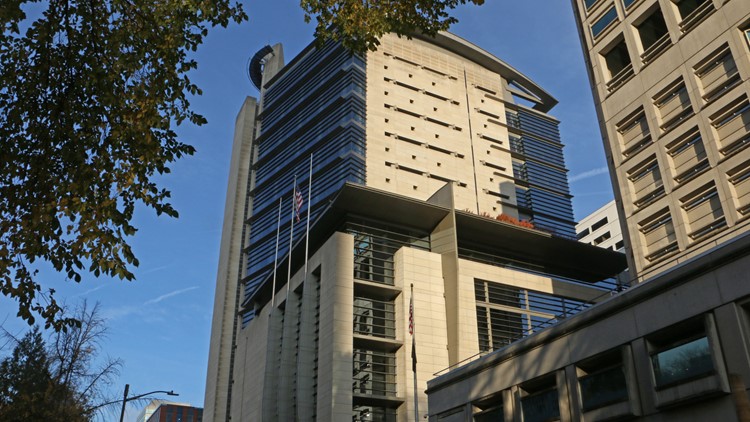PORTLAND, Ore. — The Portland business trial of the century, so far, continues this week in U.S. District Court.
Aequitas Capital Management executives Robert Jesenik, Andrew MacRitchie and Brian Rice face multiple counts of fraud, conspiracy and money laundering and could be sentenced to decades in prison if convicted. Jesenik is the firm’s founder and CEO while MacRitchie oversaw compliance. Rice, a former Key Bank market president, managed relationships with registered investment advisers.
The trial continued this week with testimony from Brian Oliver, the Lake Oswego firm's No. 2 executive who's the first of 45 witnesses the government plans to call to the stand. Oliver has, with two other former officers, also pleaded guilty to various charges.
The Portland Business Journal, a news partner of KGW, is covering the trial. Here’s what’s come to light this week.
In the late summer of 2015, Bob Holmen, Aequitas Capital Management’s general counsel, had a private conversation with Oliver.
Holmen, who had been hired about three months before, expressed concerns to Oliver about inaccurate and misleading marketing documents given to investors, pointing to the overstatement of the amount of collateral that would back their loans.
Oliver, in recounting the story, said Holmen told him: "What isn't OK is if you're raising money off of misrepresentations in the marketing materials. That's criminal. He said his job was to keep me out of jail. My mind had never gone to a place of thinking what we'd been telling investors could be potentially criminal."
By the time of Aequitas' collapse in March 2016, it owed more than $600 million to investors, though a receiver was able to recover about half that amount through asset sales.
Read more about the earlier Aequitas testimony here.
On Tuesday, attorneys continued to question Oliver. However, one of the most salient arguments happened while the witness wasn't in the room.
That's when a debate arose between the U.S. government and attorneys for Jesenik, MacRitchie and Rice regarding how Oliver's 2019 plea agreement with the government should be used in court. The 2019 plea represented a way for jurors to assess Oliver's credibility as a witness.
Oliver, who multiple times could not recall details under questioning on Tuesday, did talk about agreeing with Rice and Aequitas lawyer Bob Holmen about the need to cut expenses. But while Oliver discussed cutting expenses in one email, he still appeared to plan on traveling in the corporate jet.
In an email chain in which Oliver recommended cost cuts and offhandedly mentioned visiting someone, Jesenik wrote he assumed Oliver would take the "CJ," clarified in court as the corporate jet.
Oliver responded: "You're point? (sic) LOL — touche."
By contrast, according to MacRitchie's lawyer, MacRitchie flew commercial for an anniversary trip in 2015.
Oliver characterized Jesenik as resistant to cost-cutting. Jesenik said Aequitas couldn't reduce so much as to hinder growth, according to Oliver, who quoted Jesenik as saying, "We can't cut our way to greatness."
Here’s more on such various inside machinations at Aequitas.
RELATED: Aequitas trial: Former No. 2 Brian Oliver's credibility challenged as he concludes testimony
On Wednesday, Robert Zamarripa recalled how he had just sold his business for $270 million when his golf buddy in the exclusive community of Rancho Santa Fe, California, turned him on to Aequitas. The firm, the friend explained, invested in hospital receivables, or bad debt from patients that the firm bought at a discount and collected on, then paid interest to investors, with a recourse clause that the hospitals would buy back the debt if the patient defaulted.
It sounded like a safe, secure bet and Zamarripa would over the course of about three years invest $12 million with Aequitas, Zamarripa said during his testimony.
Zamarripa testified that had he known that his money would go to pay previous investors, as the government's case alleges, he never would have invested with Aequitas.
"To me, that is a classic Ponzi scheme, if they're taking people's money to pay other people. It's not creating value," Zamarripa testified. "I thought 100% of my money would be used" for the receivables.
Read more about the investor who lost millions here.



